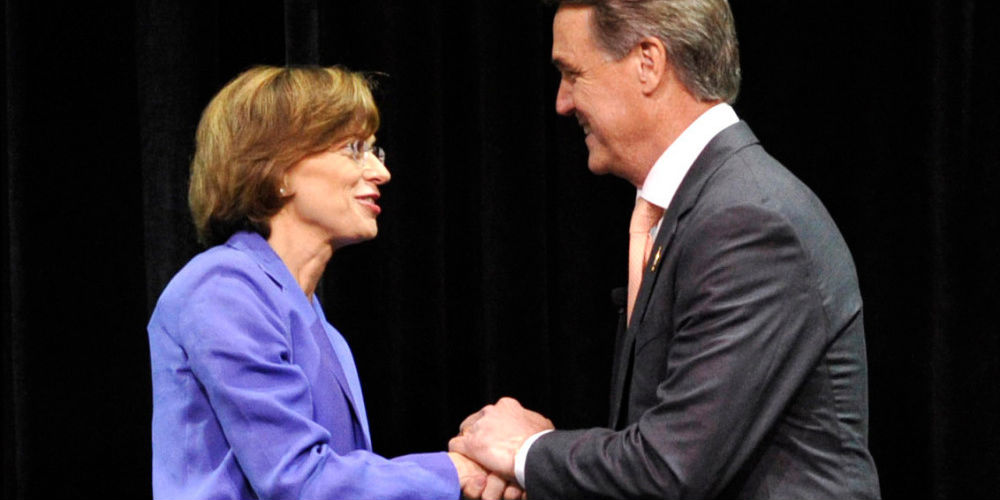Of all the Senate seats up for grabs when voters head to the polls on November 4, the race in Georgia is, perhaps, the most boring to watch. This is a truly incredibly feat, given that control of the upper chamber is on the line.
Videos by Rare
Recent polls out of the Peach State show a close race between Republican David Perdue and Democrat Michelle Nunn. Though Perdue has a small lead, the data suggest that he’ll fall just short of taking the majority of the popular vote needed to win the race outright, leaving Georgia voters to endure another several grueling weeks of the campaign.
The race, unsurprisingly, devolved into petty attacks leading Georgia voters to tune out the little substantive discussion there has been on the issues that face them and their families. Instead, Perdue has accused Nunn of funding organizations linked to terrorists while she ran the nonprofit Points of Light.
Conversely, Nunn is trying to paint Perdue as another Mitt Romney — who, by the way, won Georgia by 7 points just two years ago — by misleading voters on the Georgia Republican’s past business dealings during his brief tenure as CEO of Pillowtex, a now-defunct North Carolina-based textile firm.
Perdue, the cousin of former Gov. Sonny Perdue (R-GA), made it out of a contentious primary and runoff. But since winning the Republican nomination in July, however, he has done little to inspire voters in the general election. Though this race shouldn’t be as close as the polls show, Perdue found himself playing defense against these attacks against his private-sector record from his well-funded Democratic opponent.
Perhaps the biggest headache for Perdue is also one of the few interesting aspects of this race — the presence of a third party candidate, the Libertarian nominee, Amanda Swafford. Though she isn’t running much of a campaign outside of debate appearances and social media, a recent poll found Swafford pulling 5 percent, a portion of which, the data show, is coming from disaffected Republicans.
If the Libertarian candidate receives enough support on Election Day, much of which will be in protest of two major party candidates who have shifted far away from issues, she could throw the race into a runoff between Perdue and Nunn. With many other races up for grabs, there’s a possibility that the Peach State could be the battleground on which control of the Senate is decided. This won’t happen in November or, like Louisiana, in December. The runoff would not be decided until January 6, 2015, three days after the new Congress is seated.
The good news for Perdue is that he still has a few weeks left to right the ship before Election Day. Nunn, the daughter of former U.S. Sen. Sam Nunn (D-GA), has avoided saying much of anything about the issues that Georgians face. The Democratic nominee, for example, has on multiple occasions avoided saying whether or not she supports ObamaCare.
The most recent example came during a recent debate. Nunn told a panelist that she “believe[s] there are things we need to fix about [ObamaCare] and things that we need to build upon.” At no point did she explicitly say whether she supports the law, but she was dismissive of those, like Perdue, who want to repeal the law, telling debate-watchers, “I do not think that we want to be having this argument for the next six years.”
Much like other Republicans running in competitive Senate races, Perdue is trying to make the race a referendum on President Barack Obama’s economic policies, to which he ties Nunn. After all, Majority Leader Harry Reid (D-NV) has said that President Obama needs Nunn in the Senate to help enact his agenda.
A July poll found that less than a quarter of Georgians believe ObamaCare is a success. Forty-eight percent, however, say the law is a failure. In the remaining four weeks of the general election campaign, Perdue should begin playing offense by making ObamaCare a larger part of his message, emphasizing the negative impact it is having on Georgians through higher insurance premiums and deductibles, canceled health plans, and interference with doctor-patient relationships.
Bringing the campaign back to the issues would re-engage Republicans and independents supporting a third party candidacy, and also force Nunn to –finally– tell Georgians where she stands on ObamaCare.



